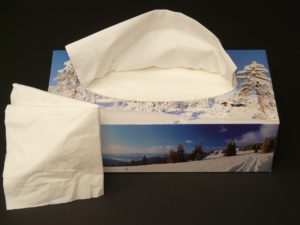You’ve heard it before – winter is coming and so is the flu. So how can you keep yourself and your family healthy? Our 5-step checklist will help you keep the sniffles away.
Certain people are at greater risk for serious complications if they get the flu. This includes older people, young children, pregnant women, and people with certain health conditions (such as asthma, diabetes, or heart disease).
If you get sick with flu symptoms, in most cases, you should stay home and avoid contact with other people except to get medical care. The flu can cause mild to severe illness, and at times can lead to death. If you have symptoms of flu and are in a high risk group, or are very sick or worried about your illness, contact your doctor or health care provider. Remind them about your high risk status for flu. Health care providers will determine whether influenza testing and treatment are needed.
Recognize the symptoms

How do you know if you have the flu? You’ll often have these symptoms:
- Fever or feeling feverish/chills (not everyone with the flu will have a fever)
- Cough
- Sore throat
- Runny or stuffy nose
- Muscle or body aches
- Headaches
- Fatigue (very tired)
- Vomiting and diarrhea (more common in children than adult
Important things you can do to prevent catching the flu and transmitting it to others – get a flu vaccine, take actions to prevent the transmission of germs, and take flu antiviral drugs if prescribed.
How to Prevent the Flu
Vaccination
A flu vaccine may help you prevent you from getting the flu. The Centers for Disease Control and Prevention (CDC) recommends a yearly flu vaccine for everyone 6 months and older as the first and most important step in protecting against flu viruses. This recommendation has been in place since February 24, 2010 when the CDC’s Advisory Committee on Immunization Practices (ACIP) voted for “universal” flu vaccination in the United States to expand protection against the flu to more people.
The flu vaccine protects against the influenza viruses that research indicates will be most common during the season. This year’s vaccine includes an influenza A (H1N1) virus, an influenza A (H3N2) virus, and one or two influenza B viruses, depending on the flu vaccine.
Preventive Actions
Most experts believe that flu viruses are spread mainly by droplets made when people with flu cough, sneeze, or talk. These droplets can land in the mouths or noses of people who are nearby. Less often, a person might also get flu by touching a surface or object that has flu virus on it and then touching their own mouth, eyes, or nose.
You may be able to pass on the flu to someone else before you know you are sick, as well as while you are sick. Most healthy adults may be able to infect others beginning 1 day before symptoms develop and up to 5 to 7 days after becoming sick.
- If you are sick with flu-like illness, the CDC recommends that you stay home for at least 24 hours after your fever is gone except to get medical care or for other necessities. (Your fever should be gone without the use of a fever-reducing medicine.)
- While sick, limit contact with others as much as possible to keep from infecting them.
- Cover your nose and mouth with a tissue when you cough or sneeze. Throw the tissue in the trash after you use it.
- Wash your hands often with soap and water. If soap and water are not available, use a hand sanitizer.
- As much as possible, avoid touching your eyes, nose and mouth.
- Clean and disinfect surfaces and objects that may be contaminated.
Flu Antivirals
Flu antivirals are prescription medicines that can make the illness milder, shorten the time you’re sick, and may also prevent serious complications. Antiviral drugs are different from antibiotics. Treatment with an antiviral drug can mean the difference between having a milder illness versus a very serious illness that could result in a hospital stay, especially if you’re in a high risk group.
Studies show that flu antiviral drugs work best for treatment when they are started within 2 days of getting sick, but starting them later can still be helpful, especially if the sick person is in a high-risk group or is very sick from the flu. Follow your doctor’s instructions for taking this drug.
Flu seasons are unpredictable and can be severe. Over a period of 30 years, between 1976 and 2006, estimates of flu-associated deaths in the United States range from a low of about 3,000 to a high of about 49,000 people.
It’s best to try to avoid getting the flu, as complications of flu can include bacterial pneumonia, ear infections, sinus infections, dehydration, and worsening of chronic medical conditions, such as congestive heart failure, asthma, or diabetes.
We hope you stay healthy and safe during this year’s flu season!
Sources: CDC Says “Take 3” Actions to Fight the Flu; CDC – The Flu: What To Do If You Get Sick; CDC – Key Facts about Influenza (Flu) & Flu Vaccine
Updated July 21, 2016

